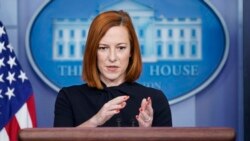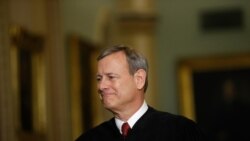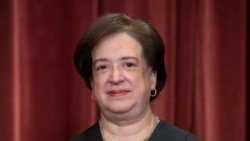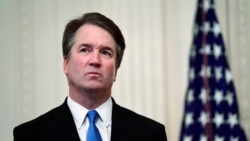The U.S. Supreme Court on Friday heard oral arguments on two of President Joe Biden's COVID-19 vaccine policies, during which it appeared skeptical about the administration's legal authority to impose these sweeping requirements.
The hearing, which lasted 3½ hours, was centered on the Occupational Safety and Health Administration (OSHA) and the Centers for Medicare & Medicaid Services (CMS) mandates.
The OSHA policy requires companies and organizations with 100 or more employees to ensure their workers are either fully vaccinated or tested weekly. This policy would affect about 80 million workers across the United States.
The CMS mandate for workers at health care facilities accepting federal Medicare and Medicaid funds requires workers to be fully vaccinated, with exemptions, including for sincerely held religious beliefs. The CMS policy would apply to about 17 million health care workers.
In a statement, White House press secretary Jen Psaki said the policies "are critical to our nation's COVID-19 response."
Republican-led states and an alliance of business and religious groups are challenging the policies' broad sweep and the effects the mandates are having on companies and workers.
The policies have, however, been endorsed by the American Medical Association, the American Public Health Association and a number of former federal health officials.
The challenge was presented before the Supreme Court after lower courts issued differing opinions on the policies.
During arguments, Solicitor General Elizabeth Prelogar, the Biden administration's top Supreme Court lawyer, told the mostly conservative panel that COVID-19 "is the deadliest pandemic in American history, and it poses a unique workplace danger."
According to The Associated Press, OSHA estimates that the emergency regulation would save 6,500 lives and prevent 250,000 hospitalizations over six months.
Some of the court's justices, though, did not seem entirely convinced about the administration's authority to impose this policy. According to The Washington Post, most of the justices seemed receptive to arguments that the states or Congress should dictate such policies, not a federal agency.
Chief Justice John Roberts cast doubt that the Occupational Safety and Health Act affords the Biden administration the power to do so, saying, "This is something the federal government has never done before."
Roberts and Justice Amy Coney Barrett asked if OSHA could impose a more targeted policy unique to workplace conditions.
Ohio Solicitor General Benjamin Flowers, who argued against the employer rule, said the administration's policy was too broad and suggested it was "not truly intended to regulate a workplace danger. It's a danger that we all face simply as a matter of waking up in the morning."
Flowers, who tested positive for COVID-19 before the hearing, delivered his argument over the phone.
The court's liberal justices expressed an understanding of the policies' aims to mitigate spread of the coronavirus. According to The Washington Post, they seemed to exhibit disbelief at the attempt to terminate the vaccination policy, given that the virus continues to rip across the U.S.
"More and more people are dying every day. More and more people are getting sick every day," said Justice Elena Kagan. "This is the policy that is most geared to stopping all this."
Justice Sonia Sotomayor said that "catching COVID keeps people out of the workplace for extraordinary periods of time."
In support of the administration's policy regarding health care workers, Brian Fletcher, the administration's principal deputy solicitor general, noted that the medical community largely supports it and that many health care workers are already required to receive the hepatitis, measles and flu vaccines.
"I think it would be bizarre to say that the secretary's authority to protect the health and safety of Medicare and Medicaid patients does not include the authority to adopt a measure that you see other regulators adopting, the medical community urging and other providers adopting voluntarily," he said.
Roberts and Justice Brett Kavanaugh seemed more receptive to the administration's defense of its authority to impose a mandate on health care workers than on other employers, according to The Washington Post.
The chief justice acknowledged the risks faced by elderly and low-income patients being treated at facilities that receive federal funds. "People already get sick when they go to the hospital, but if they go and face COVID-19 concerns, well, that's much worse," Roberts said.
Kavanaugh asked why it was the states rather than the health care companies that were challenging the policy "if the rule would be such an imposition" on their facilities and workers, The Washington Post reported.
"Where are the regulated parties complaining about the regulation?" Kavanaugh asked.
According to The Washington Post, Louisiana Solicitor General Elizabeth Murrill said the measure would "force millions of people working for or with a Medicare or Medicaid provider to undergo invasive, irrevocable, forced medical treatment. … It's a bureaucratic power move that is unprecedented."
The vaccination requirement for large companies was to go into effect on Tuesday. However, OSHA delayed this because of the litigation and said it would not immediately issue citations for those not in compliance. Testing requirements and potential fines for employers will not take effect until February.
The court's decision may come quickly, given that it heard these arguments on an emergency basis.
While it deliberates the administration's policies, COVID-19 continues to overwhelm the U.S., with millions being infected daily and over 800,000 deaths from the virus.
Some information for this report came from The Associated Press.









